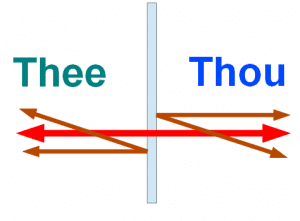What Word Do We Use Today for Thou What Word Do We Use Today for Art
 One matter that puts people off Shakespeare is the effort needed to empathize the language – particularly trying to understand the meaning of all these thees and thous! In actual fact, at the time Shakespeare was writing the people of England were speaking very much as we speak today.
One matter that puts people off Shakespeare is the effort needed to empathize the language – particularly trying to understand the meaning of all these thees and thous! In actual fact, at the time Shakespeare was writing the people of England were speaking very much as we speak today.
Here's a prose passage from Shakespeare's Julius Caesar, where Brutus addresses the Romans subsequently the conspirators take killed Caesar: "As Caesar loved me, I weep for him; as he was fortunate I rejoice at it; every bit he was valiant, I laurels him; but every bit he was ambitious I slew him. There is tears for his love; joy for his fortune; honour for his valour; and death for his ambition."
Although Shakespeare technically wrote in Early Modernistic English at that place's cipher in that passage that's not written in a linguistic communication all modern English speakers would recognise. It's Mod English language as we know information technology, and immediately accessible to all of us…so what is all this about thees and thous?
Past the fifteenth century the use of thee/thou and yous/your was a firmly established index of social status. That is something of an oversimplified statement, though, considering the words were also used to express relationships among family and neighbor groups. If you were a person of low social rank, in talking to someone of loftier rank you would address him/her with the words you and your, whereas he/she would use thee/thou in talking to y'all. Within the family the parent may accost the child as grand, and if the parent assents to it the child may address him/her besides, then information technology becomes an expression of affection. Lovers will address each other every bit g. It's similar to the French apply of tu instead of the more formal vous.
Past the eye of the sixteenth century – when Shakespeare was writing – this system of thee/thou & you/your was breaking downward. In that location's picayune trace of it in English today, and although some English language dialects in both America and England still employ the thee and the thou it's fading fast as communications change and mass media drives ever faster language development.
Students who object to Shakespeare'southward apply of thee and thou earlier they have encountered a Shakespeare text will somewhen get more out of the play when they understand the use of those words. They volition come to see that Shakespeare is using them creatively.
Shakespeare's plays are filled with the interplay ofyou andthou, with characters expressing mistrust and suspicion, formality, affection, honey, a business-like relationship, insults and so on, sometimes those words dancing around each other in a single conversation.
For the most part in Shakespeare'due south plays, those of high condition will address those they consider to exist below them as grand, and those of lower status will address their superiors equally you. But the use of those words is also an opportunity to create undercurrents and subtleties in the relationships between characters. A character tin can express his or her sense of importance by addressing someone of the same rank with 'thee', for case, thereby sending a message about that relationship. Not but that, just a rebellious bailiwick, for case, may address his king with thee. That would be an insult of monumental proportions. Two people of equal rank, talking to each other, would use the polite grade of 'you lot' just if one started becoming too familiar the other might put him down with the use of 'chiliad'.
Some examples of how Shakespeare plays with thee and thou:
- In Twelfth Night Viola, bearded every bit a man, goes to woo Olivia on Duke Orsino's behalf. Olivia questions her, using the more formal address: What is your parentage? Viola says that 'he'southward' a gentleman. Olivia falls in love with the young messenger during that interview and afterwards, going over it in her mind, she thinks of him more intimately with I am a gentleman. I'll be sworn 1000 art.
- In Hamlet, Polonius, telling his son, Laertes, off, mocking him slightly, says that the transport he's about to commence is about to prepare sail and is waiting for this 'important' rider with and you are stayed for, only a bit after, embracing him and saying goodbye he says my approval with thee, expressing his affection.
- The complexity of the relationship between Beatrice and Benedick in Much Ado well-nigh Nothing is largely expressed in the style they address each other with those words.
So that'southward the guide to thee and k meanings. Make sense? Join in by leaving a comment below.
Source: https://nosweatshakespeare.com/blog/thee-and-thou-what-does-it-all-mean/